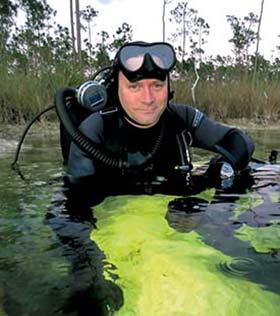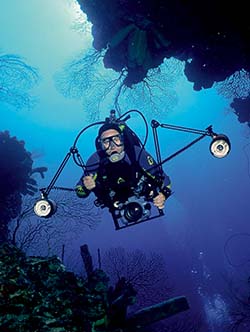An Emmy-winning series offers a glimpse of a magical world.

Jonathan Bird ’02G has learned a thing or two during his career as an underwater cinematographer—like never snorkel with a bunch of gray reef sharks, who will mistake you for bait as you float on the surface. Instead, don your diving gear and swim among the shadowy fish, 200 feet down. “They’ll think you’re a big, ugly predator and be scared off by the noisy bubbles from your scuba gear,” says Bird. He’s also learned to crawl silently along a sandy beach under a dark night sky, following a sea turtle as she drags herself from the water to higher ground and digs a hole to lay 100 eggs. He’s made friends with a 6-foot Pacific wolf eel, come face to face with a stranded pilot whale, and discovered the magic of mangrove seeds, which somehow take root as they bob in the surf and then grow into giant trees, gnarled defenders of the ocean.
“Welcome to my world!” exclaims Bird, his voice supercharged with enthusiasm as he stands along a rocky coastline talking to the camera. Every episode of his Emmy Award-winning series, “Jonathan Bird’s Blue World,” begins the same way. He throws his arms wide as if to embrace the entire expanse of ocean behind him, and then the camera cuts to an image of the host-producer in full scuba gear—followed by a splash, as Bird plunges into another underwater adventure. His mission? To spark wonder and amazement—and a commitment to saving this underwater world.
Bird’s own journey into the deep began by accident—with a scuba class to fulfill a gym requirement at Worcester Polytechnic Institute. “It was life-changing,” he says. After graduation, Bird kept diving and taught himself how to make videos. A few years later, when the lure of the ocean grew too strong, Bird quit his job as an engineer at Raytheon and enrolled in UNH’s ocean engineering program, where he focused on marine biology. “I was the nerdy guy at the front of the class with my hand up all the time,” he says. “I was just so stoked to be learning about this stuff.”

Over the next few years, he did a number of freelance projects, including a shark film for PBS. He also survived a gut-wrenching setback when a distribution company that owed him $100,000 went bankrupt. To pay his bills, Bird took a teaching job for a few years. In 1999, when he was giving a talk at a local dive club, he met his wife, Christine, an accomplished diver herself. “I knew she was the one when she was happy to go diving on our first date,” says Bird. Today Christine, who works full time as a family physician, is also executive producer of the show.
Bird, who has made films for National Geographic, ABC, USA Network and SciFi Channel, says PBS has been a good home for his show, which is independently produced. “We like the fact that since we’re not owned by a particular network, we can make the show the way we see fit,” he says, noting that his most important critics are his two elementary-school-age children, who watch rough cuts of each show.
He also hears from “tons of fans around the world,” he says; his Facebook page includes recent posts from Norway and New Zealand. “I hear from so many kids saying they want to grow up to be marine biologists that I have this fear that in 20 years there will be a glut of marine biologists—all unemployed and blaming me!”
During the show’s first three seasons, the team collected eight regional Emmy Awards, including one for best children’s program, and also received a $120,000 National Science Foundation grant for the development of materials for teachers. “We’re proud of the fact that we’re educational enough to get an NSF grant—and entertaining enough to win an Emmy,” says Bird.
Whether he’s drifting through a giant underwater cave in search of the elusive blind cavefish, following a “flying” manta ray or holding a giant sea snake up for viewers to get a better look, Bird, who constantly punctuates his on-camera narration with words like “epic” and “magical,” is always after the same thing: He wants to tell a good story—one that takes everyone right along with him. He wants them to be there when he gets head-butted by a dolphin. Or when he stabs himself on a spiny sea urchin. He wants them to wait and watch for the moment when the humpback whale and her calf finally turn and come towards the camera, rolling and sweeping in a graceful arc just feet from his lens. These are the moments that capture the imagination. That make people care. These are the moments, says Bird, that hold the best hope for the future of his beloved watery blue world. ~